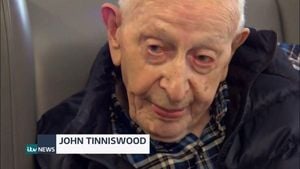After months of political strife and turbulent protests, Venezuela has taken decisive steps following its recent presidential election, marred by controversy and division. This weekend, the Venezuelan government announced the release of several individuals detained during and after violent protests sparked by the disputed election results held back in July.
The release of these detainees marks a significant moment for many families who had been anxiously awaiting the reunification with their loved ones. Images from outside prisons captured the emotion of tearful reunions as individuals were freed, some of whom had been incarcerated for weeks. The emotional scenes reflect the intense atmosphere surrounding the election and its aftermath.
This decision to release detainees followed statements made by the Attorney General, who is known for his loyalty to the ruling party. He indicated during the weekend's announcement plans to review 225 cases associated with the aftermath of the election. The political climate, which has included claims of electoral fraud from both President Nicolás Maduro and opposition candidate Edmundo González, has put the spotlight on human rights abuses as dissent protests continue to ripple through the nation.
Since the election, which saw tens of thousands taking to the streets, the treatment of protesters has drawn international condemnation. Reports indicate many were unreasonably detained, prompting various human rights organizations to call for the release of those wrongfully imprisoned.
On the political front, the disputed election has fueled tensions not just within the country, but also from foreign nations watching closely. Several countries have questioned the legitimacy of the electoral process and have called for free and fair elections to be upheld. To date, the Maduro administration has managed to maintain its grip on power, albeit at the cost of increased scrutiny and tensions with the opposition.
Opposition leaders have faced significant challenges when trying to navigate this fraught political environment. Edmundo González, who claims to have won the election, has accused Maduro's administration of suppressing dissent and using state apparatus against legitimate political opposition. His statements have added to the already charged atmosphere surrounding the government and its critics.
The prison releases coincided with news and discussions among activists and human rights supporters who continue to advocate for political change and the release of other detainees. Many are rallying calls for accountability against officials linked to human rights violations. Activists maintain there should be no tolerance for oppressive politics, particularly concerning individuals who have been disenfranchised during the election process.
Inside the country, the situation continues to evolve. Protests have persisted, with activists and citizens demanding reform and freedom for all political prisoners. These calls are emboldened by the recent releases, hinting at the potential for broader political maneuvers within the Venezuelan government.
For families who experienced the anxiety of separation, the releases represent a small victory, yet the overall struggle for justice and political reform is far from over. Many remain skeptical of the government’s motives, suspecting the releases might simply be strategic, aimed at easing domestic and international pressures.
Notably, the current political climate reflects the deep divisions tearing at the fabric of Venezuelan society. The challenge remains as to how the Maduro administration will navigate this continuing unrest, balancing their authority with the demand for accountability and justice from the populace.



